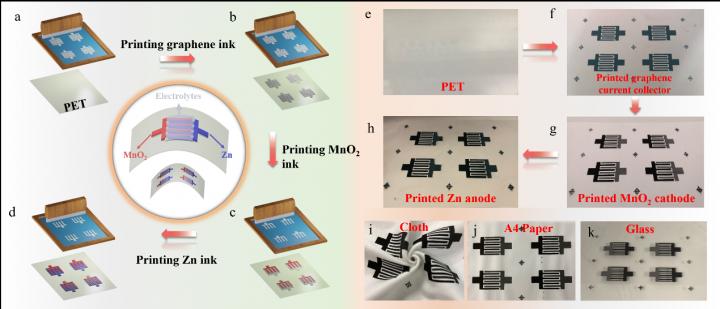
Credit: ©Science China Press
Increasing development of micro-scale electronics has stimulated demand of the corresponding micro-scale power sources, especially for micro-batteries (MBs). However, complex manufacturing process and poor flexibility of the traditional stacked batteries have hindered their practical applications.
Planar MBs have recently garnered great attention due to their simple miniaturization, facile serial/parallel integration and capability of working without separator membranes. Furthermore, planar geometry has extremely short ion diffusion pathway, which is attributed to full integration of printed electronics on a single substrate. Also, in order to get rid of the safety issues induced by the flammable organic electrolyte, the aqueous electrolyte, characterized by intrinsic nonflammability, high ionic conductivity, and nontoxicity, is a promising candidate for large-scale wearable and flexible MB applications. As the consequence, various printing techniques have been used for fabricating planar aqueous MBs. “In particular, screen printing can effectively control the precise pattern design with adjustable rheology of the inks, and is very promising for large-scale application.” The author said.
In a new article published in Beijing-based National Science Review, Zhong-Shuai Wu at Dalian Institute of Chemical Physics, Chinese Academy of Sciences, constructed aqueous rechargeable planar Zn//MnO2 batteries by applicable and cost-effective screen printing strategy. “The planar Zn//MnO2 micro-batteries, free of separators, were manufactured by directly printing the zinc ink as the anode and γ-MnO2 ink as the cathode, high-quality graphene ink as metal-free current collectors, working in environmentally benign neutral aqueous electrolytes of 2 M ZnSO4 and 0.5 M MnSO4.” The author stated. Diverse shapes of Zn//MnO2 MBs were fabricated onto different substrates, implying the potential widespread applications.
The planar separator-free Zn//MnO2 MBs, tested in neutral aqueous electrolyte, deliver high volumetric capacity of 19.3 mAh/cm3 (corresponding to 393 mAh/g), at 7.5 mA/cm3, and notable volumetric energy density of 17.3 mWh/cm3, outperforming lithium thin-film batteries (
This satisfactory result will open numerous intriguing opportunities in various applications of intelligent, printed and miniaturized electronics. Also, this work will inspire scientists working in nanotechnology, chemistry, material science and energy storage, and may have significant impact on both future technological development of planar micro-scale energy-storage devices and research of graphene based materials.
###
See the article:
Xiao Wang, Shuanghao Zheng, Feng Zhou, Jieqiong Qin, Xiaoyu Shi, Sen Wang, Chenglin Sun, Xinhe Bao, Zhong-Shuai Wu
Scalable Fabrication of Printed Zn//MnO2 Planar Micro-Batteries with High Volumetric Energy Density and Exceptional Safety. Natl Sci Rev (June 2019) doi: 10.1093/nsr/nwz070
https:/
The National Science Review is the first comprehensive scholarly journal released in English in China that is aimed at linking the country’s rapidly advancing community of scientists with the global frontiers of science and technology. The journal also aims to shine a worldwide spotlight on scientific research advances across China.
Media Contact
Zhong-Shuai Wu
[email protected]
Related Journal Article
http://dx.




